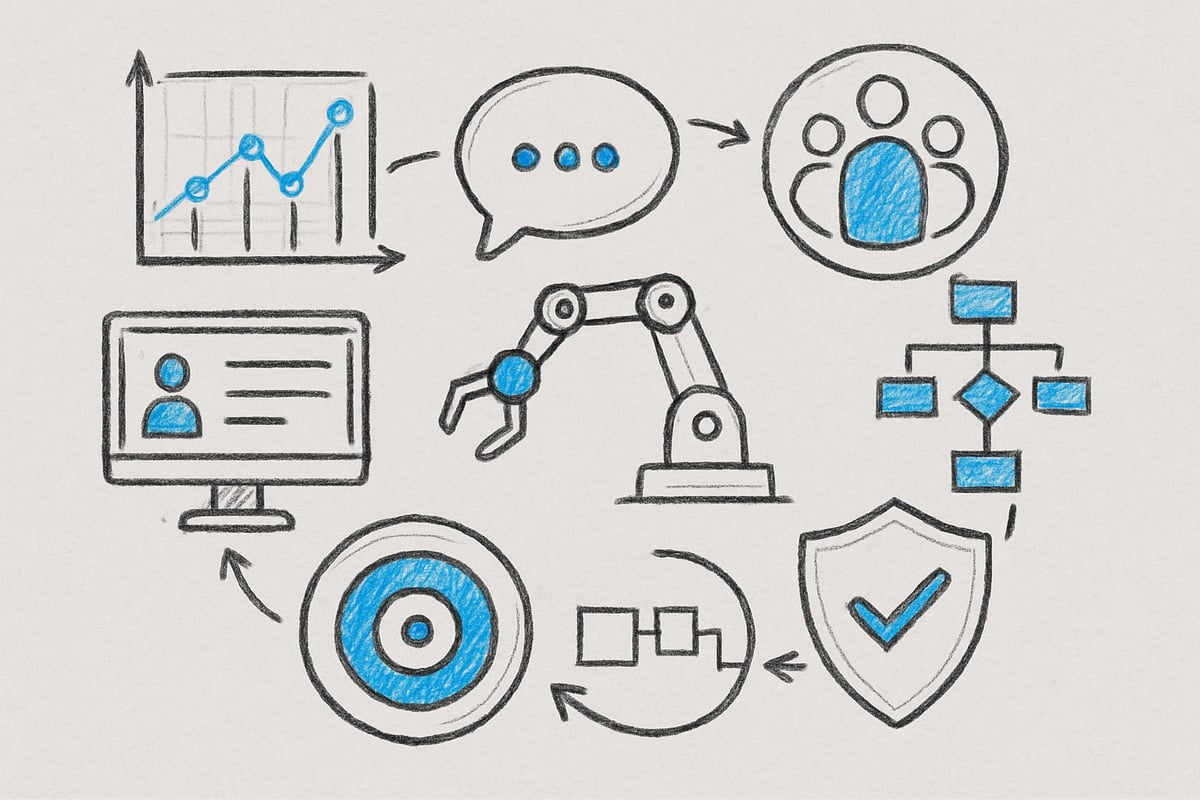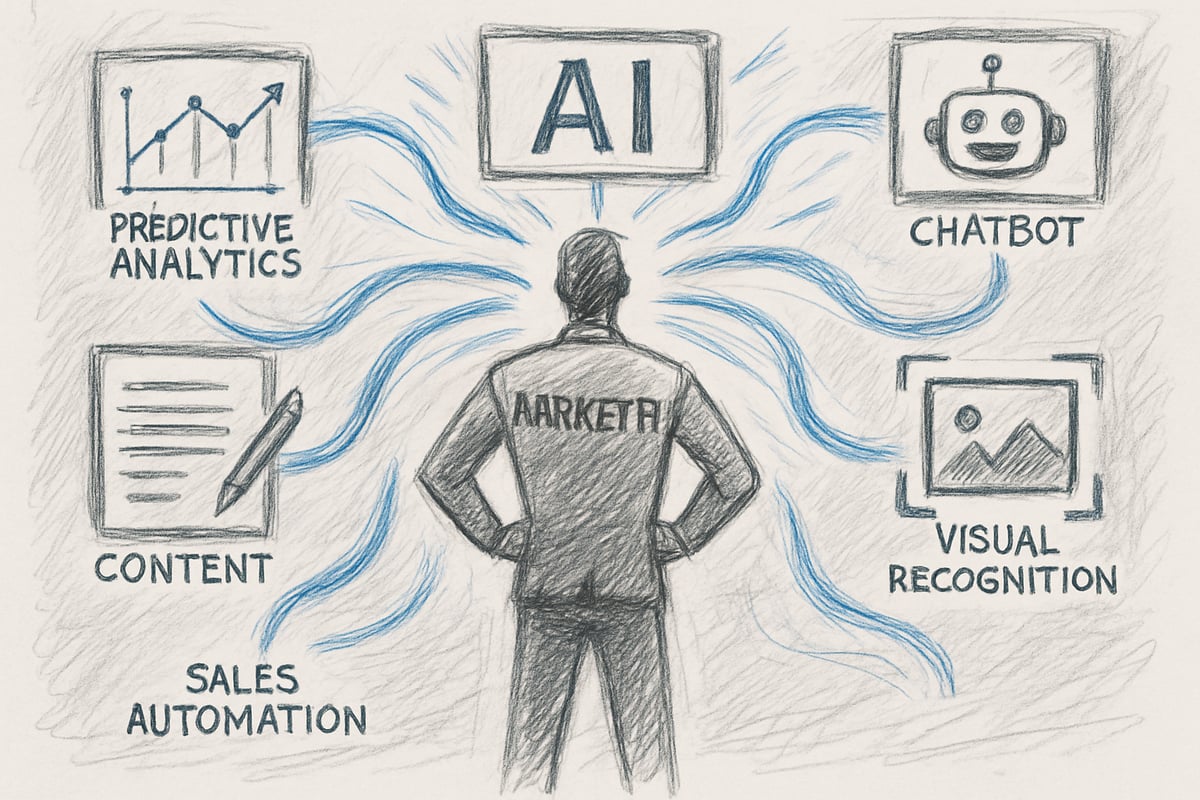Artificial intelligence is revolutionizing the marketing landscape at an unprecedented pace. As we head into 2025, over 90% of marketers are already leveraging AI-powered tools to gain a competitive edge.
AI in marketing automation is no longer a futuristic concept. It is now the powerhouse behind next-level personalization, operational efficiency, and measurable ROI. Brands are harnessing its potential to deliver smarter, faster, and more relevant experiences to every customer.
In this article, you will discover eight transformative ways AI in marketing automation is shaping the future. We will explore predictive analytics, hyper-personalization, conversational AI, campaign optimization, sales automation, visual recognition, ethical practices, and advanced orchestration.
Curious how to adapt and thrive? Dive in to unlock actionable insights and future-proof your marketing strategy for the AI-powered era.
8 Ways AI in Marketing Automation Is Transforming 2025
The landscape of ai in marketing automation is evolving at an unprecedented pace as we approach 2025. Businesses are leveraging advanced AI technologies to streamline operations, boost efficiency, and deliver tailored experiences. From predictive analytics to next-gen orchestration, these eight transformative methods are redefining how marketers connect with their audiences and drive results.

1. Predictive Analytics & Customer Micro-Segmentation
Predictive analytics is revolutionizing ai in marketing automation by enabling brands to anticipate customer behaviors with remarkable accuracy. AI-powered tools sift through massive datasets to uncover actionable patterns, making it possible to forecast buying cycles, predict churn risk, and identify emerging trends.
Micro-segmentation takes this further by dividing audiences into highly specific groups based on real-time behaviors, demographics, and preferences. For example, Natural Cycles uses AI-driven segmentation to tailor messaging for each user, resulting in more relevant and engaging communications.
According to Statista, 88% of marketers say AI helps personalize customer journeys. This high level of personalization ensures campaigns are timed perfectly, delivered through the right channels, and feature offers that truly resonate. The impact of ai in marketing automation here is clear: enhanced targeting drives higher conversion rates and boosts ROI.
| Benefit | Impact |
|---|---|
| Campaign Timing | Improved relevance and engagement |
| Channel Selection | Higher reach and conversion |
| Offer Personalization | Increased customer satisfaction |
However, success relies on data quality and model accuracy. Inaccurate or incomplete data can lead to flawed predictions, so continuous refinement is essential. As ai in marketing automation becomes more sophisticated, maintaining clean data and monitoring model performance will be crucial for ongoing success.
2. Hyper-Personalized Content & Real-Time Recommendations
The rise of ai in marketing automation has ushered in a new era of hyper-personalized content. Advanced tools like ChatGPT, Claude, and Midjourney generate text, images, and videos tailored to each user’s interests. This enables dynamic content that adapts in real time to user sentiment and context.
Spotify’s AI-powered playlists are a prime example, curating recommendations based on listening habits and preferences. Marketers also use AI to create graphics and automate designs with platforms like Adobe Creative Cloud Express and Canva. These innovations have led to 88% of marketers reporting improved personalization thanks to AI.
AI-powered email campaigns and personalized website experiences keep users engaged and increase loyalty. For instance, an adaptive email campaign can adjust its messaging based on recipient interactions, ensuring every touchpoint feels unique.
Yet, there are limitations. Over-personalization can raise privacy concerns, and ethical considerations must guide how data is used. To explore more on the latest trends, see AI in Marketing Automation Trends 2025, which highlights how hyper-personalization is shaping the future of marketing.
3. Conversational AI & Intelligent Chatbots
Conversational AI is transforming ai in marketing automation by moving beyond basic chatbots to advanced agents powered by natural language processing. These intelligent systems provide 24/7 customer support, delivering quality interactions while reducing operational costs.
Modern chatbots handle complex queries, adapt their responses based on user tone and intent, and maintain a consistent brand voice. Lemonade Insurance’s chatbot Maya is a standout example, managing 25% of customer inquiries and even selling policies.
Gartner predicts that by 2027, chatbots will be the primary customer service channel for 25% of businesses. The benefits are clear: cost savings, faster response times, and improved satisfaction. Conversational AI integrates seamlessly with CRM and sales automation platforms, ensuring a unified customer experience.
Despite these advances, challenges remain. Effective training data, handling sensitive situations, and protecting brand reputation are ongoing concerns. As ai in marketing automation continues to evolve, brands must invest in robust chatbot training and oversight to ensure positive outcomes.
4. Campaign Optimization & Performance Measurement
AI-driven campaign optimization is a cornerstone of ai in marketing automation, empowering marketers to track performance and adjust strategies in real time. Tools like Google Analytics 360 and Zoho Analytics deliver actionable insights, allowing for automated KPI monitoring and rapid decision-making.
AI can automatically adjust campaigns based on engagement and conversion metrics. The North Face, for instance, used AI to detect new search terms, resulting in a threefold increase in conversions. Closed-loop reporting ensures every stage, from creation to execution, is measured and refined.
A key advantage is multichannel attribution, where AI identifies top-performing channels and content for ongoing improvement. Marketing teams can use AI for marketing automation tools to streamline this process. For a comprehensive overview of essential AI tools, refer to AI Tools for Marketing Automation.
Barriers include data integration and interpreting AI-driven recommendations. Marketers must ensure their teams have the skills to leverage these insights effectively, maximizing the value of ai in marketing automation.
5. Lead Scoring & Enhanced Sales Automation
Lead scoring powered by ai in marketing automation enables businesses to prioritize prospects with the highest potential. Predictive algorithms analyze a wealth of customer data to forecast conversion likelihood and customer value, ensuring sales teams focus on high-impact opportunities.
Automated lead nurturing campaigns are triggered by user actions, providing timely and relevant communications. U.S. Bank’s use of Salesforce Einstein led to 25% more closed deals and a 260% increase in lead conversion, demonstrating the tangible benefits of AI-driven sales automation.
Integration with CRM platforms ensures seamless alignment between sales and marketing, reducing manual workloads and increasing productivity. According to Salesforce, 98% of sales teams recognize the value of automated lead scoring.
However, over-reliance on algorithms can be risky. Models require ongoing refinement to stay effective, and human oversight is essential to catch nuances that AI might miss. As ai in marketing automation becomes more embedded in sales processes, balancing automation with expertise is key.
6. Visual Recognition for Social & Ecommerce Marketing
Visual recognition is an exciting frontier for ai in marketing automation. AI algorithms can analyze images and videos to identify brand-relevant content and user-generated media, unlocking new ways to engage audiences.
Visual search engines are gaining traction, allowing shoppers to find products through images rather than keywords. L’Oreal’s Beauty Genius leverages AI-powered visual recognition and augmented reality to deliver personalized beauty recommendations.
Automated tagging, keyword generation, and SEO enhancement for visual content improve discoverability and drive ecommerce success. The AI-powered ecommerce market is projected to reach $16.8 billion by 2030, highlighting its rapid growth.
AI also enables real-time sentiment analysis using facial recognition and emotion detection, offering deeper insights into customer reactions. However, privacy and accuracy remain challenges. As ai in marketing automation expands into visual domains, brands must prioritize ethical data use and model reliability.
7. Ethical AI, Transparency & Data Responsibility
Ethical use of ai in marketing automation is not optional—it is essential for building consumer trust. Marketers must communicate transparently about AI usage, ensuring customers understand how their data is collected and used.
Campaigns like O2’s “AI Granny” demonstrate how brands can use AI to address societal challenges, such as combating scams. Obtaining clear consent and offering opt-out options are fundamental strategies for responsible data practices.
Marketers must address issues of bias, fairness, and accountability in AI-driven campaigns. Compliance with regulations such as GDPR and CCPA is mandatory, and the regulatory landscape continues to evolve.
Explainable AI is increasingly important, helping brands clarify how decisions are made. The risks of data misuse are significant, so adopting strong governance and regular audits ensures ethical ai in marketing automation remains a priority.
8. Next-Gen Orchestration: Multichannel Journeys & Next-Best-Action Decisioning
Next-gen orchestration is pushing ai in marketing automation into new territory. AI-driven platforms now coordinate customer journeys across multiple channels, ensuring every interaction is personalized and timely.
Next-best-action algorithms analyze user behavior to deliver the right message at the right moment, whether through email, mobile, or social media. Integration with platforms like Optimove’s OptiGenie AI enables dynamic journey mapping and cross-channel campaign coordination.
The benefits are significant: scalable personalization, improved customer experience, and higher ROI. In sectors such as retail and gaming, AI models autonomously cluster customers and optimize campaign sequencing for maximum impact.
Looking ahead, predictive journey mapping and self-optimizing campaigns will further enhance ai in marketing automation. Marketers who embrace these innovations will be well-positioned to deliver seamless, high-converting experiences.
The Future of AI-Driven Marketing Automation
As we look ahead to 2025 and beyond, the impact of ai in marketing automation is becoming increasingly profound. The eight transformative trends explored—from predictive analytics to next-gen orchestration—are not evolving in isolation. They are converging to create a fully adaptive, intelligent marketing ecosystem that is reshaping how brands engage with audiences, optimize campaigns, and drive growth.
Today’s marketing automation is shifting away from rigid, rule-based workflows. Instead, marketers are harnessing the power of ai in marketing automation to orchestrate complex, multichannel journeys that respond instantly to customer signals. This evolution empowers brands to deliver the right message at the right time, maximizing relevance and ROI.
| Automation Type | Key Features | Outcome |
|---|---|---|
| Rule-Based | Pre-set triggers and rules | Static, predictable responses |
| AI-Driven | Adaptive, data-driven | Dynamic, personalized journeys |
This transformation is redefining the marketer’s role. No longer just campaign managers, professionals now act as AI strategists, curators, and data interpreters. To stay competitive, marketers must develop expertise in data literacy, ethical AI use, and platform integration. Continuous upskilling is essential as the landscape of ai in marketing automation grows more sophisticated.
Must-Have Skills for the AI-Ready Marketer:
- Data analysis and interpretation
- Understanding of AI and machine learning basics
- Familiarity with marketing automation platforms
- Commitment to ethical AI practices
- Agility in adapting to new tools and trends
Looking forward, we can expect ai in marketing automation to drive even greater innovation. Predictive journey mapping, autonomous campaign optimization, and hyper-personalized experiences will continue to push the boundaries of what’s possible. For deeper insight into how these technologies are converging, explore AI for Marketing Insights.
To build a future-proof marketing organization, leaders must foster a culture of learning and experimentation. Staying updated with AI advancements, investing in talent, and prioritizing transparency will be key. The next wave of AI will likely bring self-optimizing campaigns and even smarter orchestration tools, requiring marketers to remain both curious and vigilant.
In conclusion, embracing ai in marketing automation as a foundational pillar is no longer optional. It is the pathway to delivering greater value, deeper personalization, and sustained business growth. As the future unfolds, those who proactively adapt will lead the way in a rapidly evolving digital landscape.

